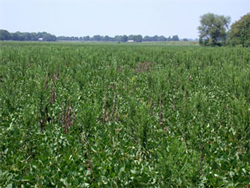 The problem of resistant weeds, especially glyphosate-resistant broadleaf weeds, continues to become more worrisome, but some weeds have always had a tolerance for certain weed killers.
The problem of resistant weeds, especially glyphosate-resistant broadleaf weeds, continues to become more worrisome, but some weeds have always had a tolerance for certain weed killers.
BASF Herbicide Technical Market Manager Dr. Dan Westberg says there’s is a difference between resistant weeds and tolerant weeds. “Tolerant weeds are ones that a herbicide never really controlled in the first place,” Dan explains. “If you look as species like wild buckwheat, morning glory, day flower – those types of weeds were never really controlled very effectively with glyphosate.”
 Resistance is different because it develops over time. “With resistant weeds, you’ve gone from getting essentially total control of a population to selecting a biotype, or individual weed that has the ability to tolerate that herbicide,” and Dan says those resistant biotype populations can then expand and dominate in a field.
Resistance is different because it develops over time. “With resistant weeds, you’ve gone from getting essentially total control of a population to selecting a biotype, or individual weed that has the ability to tolerate that herbicide,” and Dan says those resistant biotype populations can then expand and dominate in a field.
Dan notes says there are several mechanisms within a plant that can lead to resistance. Listen to him explain here: Dan Westberg on weed resistance
Dan recommends that growers use a combination of chemical, cultural and mechanical strategies to lower the risk of developing resistance and tailor their weed management approach to the weed populations that exist in particular fields. Dan Westberg on lowering risk
He encourages growers if they see escapes not attributable to sprayer skip or a mixing problem to work with a local extension agent or university weed scientist to collect seed from the weed and have it tested for resistance.
